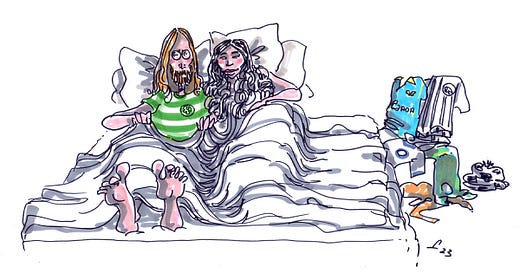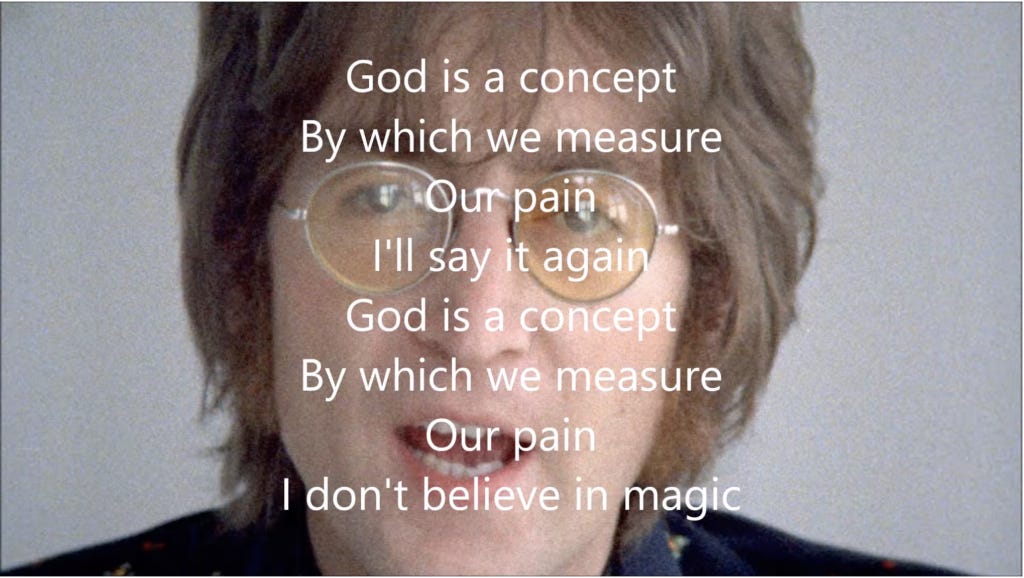I just believe in me, Yoko and me!
Football at lower levels might no longer be a Theatre of Dreams, but it is a Library of Memories. This is hugely important, almost sacred, but the pertinent question is for how long?
The Albachiara Journal is an eclectic collection of our opinion and perspective, from our travels and encounters.
One of John Lennon‘s first post-Beatles compositions is a song called God, a personal favourite. It starts with the killer line:
God is a concept, by which we measure our pain.
So powerful a lyric that he repeats it.
As a young man, a theist to boot, this caused me much reflective angst.
The more that you are in pain in your life, the more you reach for God. And, of course, vice versa. People and populations in the main lose religion as they come out of poverty and struggle. The more your life stinks, the more you need something to take the pain away. Some go to heroin or drink, others to daily Mass, and an idea that the tables will be turned in the next life.
That’s the Lennon premise. I don’t buy it fully, and never did.
Many smart, perfectly successful and happy people see their prayers not as a painkiller. They are true believers.
Lennon’s song continues, its complex philosophy clearly drawing a line under the Beatles, and indeed the 60s.
I was the dream weaver
But now I’m reborn
I was the Walrus
But now I’m John
And so dear friends
You’ll just have to carry on
The dream is over
The lists of popular idols and beliefs that he rejects, from Jesus, to Elvis, to Dylan, can not leave you indifferent. It’s very potent.
It’s clear Lennon is lost in this moment.
The song finishes with a sigh; after a decade of searching for the answers that fame, money, drugs and the Maharishi didn’t supply him… he concludes:
I just believe in me, Yoko and me. And that’s reality.
Each of us takes from that last line what we want and need. It’s an important credo.
The group U2, famously religious, years later, composed an “answer song” with God Part 2.
Very much worth a listen. It has this lyric.
Don’t believe in the 60’s
The golden age of pop
You glorify the past
When the future dries up
And the brain immediately wanders to any parallel that all this brings to our sport of football. This is a sports column after all.
How many football clubs does this U2 verse apply to? You glorify the past when the future dries up.
Certainly my own, Glasgow Celtic, has been a victim of the winds of change. And how many traditional, glorious Northern and Midlands clubs are in the same boat?
A boat that looks like a Blackpool, a Preston, a Derby, a Como. Where you aren’t really competitive any more, where the crowd around you has aged as you have, where it all looks a bit naff, last century. They’d call it “Boomer” sport.
Makes you think.
What is the future for non-Hollywood Association Football?
We talk constantly of mega clubs, marquis players, and the billions needed to finance them.
But what of the long tail? Those clubs the other side of the drawbridge.
What do they now represent, and crucially, WHY should they exist? What is their future? Are they adding any new fans to the funnel? What still holds people to follow a club who can’t win anything that matters, who are very far away from the real action, the top table?
The reasons are diverse.
None of them include bringing in a regulator to subsidise them.
But in those answers lies the very future of the game, and I’d argue sport in general.
Find the “why”, find the source of the Nile, and then you can successfully market your sport based on that.
I don’t think football reflects on this enough. It’s always been a lazy industry. Taking its loyalty for granted.
Finding the “Why” of community football.
What is the motivation for people to continue to follow and support losing local teams?
I myself have suffered many a figurative sore face trying to intellectualise this. Projecting my own reasons, as truths for everyone else. Fan loyalty to a (losing) club is bigger than the need to win and compete at the highest, that some of us have. I’m an outlier. A creep, a weirdo (to quote another Parlophone artist). But I’m not alone.
Many Celtic fans are like me, for their own reasons. On reflection, however, I never realised how much being part of the industry, in charge of the sausage factory, the league, changes you. You don’t ever look at the game the same again. Part of the magic is gone. It’s the hidden tax of working in football.
Nevermind.
What else explains it?
If God is a concept by which we measure our pain, I think something similar happens in small football clubs.
The more crap our life is, the more we need something bigger than us, the tribe, to channel our hope of a better dawn. The thing to look forward to, in a dreadfully mondane life? Even better if it represents a “cause”. This is the “football is an opiate that eases the pain” answer. Twas always thus. The working man’s escape.A football stadium has hosted a selection of moments of male bonding, between friends, brothers, fathers and sons, that render the location almost shrine like.
This is always missed by the “football as brand and entertainment” crowd.
Football at lower levels might no longer be a Theatre of Dreams, but it is a Library of Memories.
This is hugely important, almost sacred, but the pertinent question for the sport, and industry, is for how long?
Let’s take all this into the Follow the Money filthy lucre analysis. We need to… coz football loses money and needs someone new to believe in it. That’s easy for the mega clubs. Less so, for the long tail. This is a big, big issue.
Is community football investable?
To continue reading this article, including the biggest geopolitical issue of our time and why Saudi really really matters, please click here.






Good job, Roger! Totally agree, even if AS Roma is THE concept by which we measure our pain, unfortunately...😉